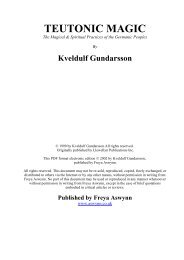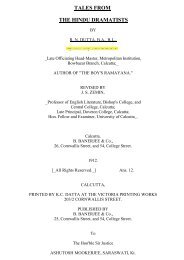Untitled - Awaken Video
Untitled - Awaken Video
Untitled - Awaken Video
Create successful ePaper yourself
Turn your PDF publications into a flip-book with our unique Google optimized e-Paper software.
Chapter 3. Midgard 83<br />
the animals (especially during the summer months when diseases were spread by<br />
hoards of insects), reap the harvests, and store meat and produce for the upcoming<br />
harsh winter months. After the work was done there was still a certain amount of<br />
trusting to one’s luck that the crops wouldn’t fail or that the grass would be good<br />
or that the animals didn’t succumb to some epidemic, and obviously the Germanic<br />
peoples, particularly in the far north, felt more comfortable trusting their luck to<br />
local spirits than to a foreign God who seemed more concerned about life after death<br />
than the dirt in the fields.<br />
If one allows that the eddaic and sagaic writings are representative of the people’s<br />
attitudes towards nature at the time of their commitment to manuscript and in spite<br />
of the fact that there are most certainly Christian interjections and interpretations<br />
in the texts, then the early Teutons were possibly not truly animistic in their philosophy.<br />
Animism implies that everything has a soul and a life to some degree,<br />
and some researchers enjoy pursuing evidence of such a philosophy believing that<br />
all primitive peoples must buy into animism in one form or another. From the<br />
recorded sources, however, nature seems to be divided up into small “domains” with<br />
various guardian spirits over them. Grain mills have the kverngrubbe; forests have<br />
skogsraan rivers have the näck waterfalls have the fossegrim; the sea has “merfolk”;<br />
cliffs, rocks, mountains have a variety of giants and trolls; and, mounds and hills<br />
have huldrafolk, “hogboys” (haugbui = “mound dweller”), or ancestors. One could<br />
also choose to take the perspective of lineage, and in doing so would quickly notice<br />
that all things are “alive” in the sense that they all have a past or an ¸orlög. No<br />
direct evidence for such can be found in any of the Germanic writings, but such<br />
can easily be implied applying techniques of analysis similar to those which inspired<br />
Bauschatz or Glosecki. Which ever view one takes makes little difference in the long<br />
run because it is quickly realized that all things must be treated with a degree of<br />
respect either as individual objects or as part of a larger domain under the care of<br />
some local guardian.<br />
For many moderns, an animistic worldview is frightening because any single<br />
action, no matter how small, may inadvertently irritate the spirit living within a<br />
thing and may result in revenge for an act unknowingly committed or that before<br />
acting an individual would have to spend an inordinate amount of time asking for<br />
permission which would result in very slow progress overall. For societies which<br />
thrive on progress such as the industrial nations of the 20th century, such a process<br />
would be slow and laborious. Additionally, it is well stated that modern Christians<br />
believe that the “things” of this world are under the dominion of man, and so an<br />
animistic worldview would not only be a hindrance to progress, but would also<br />
stand in direct opposition to their God-given right to do what is necessary for the<br />
betterment of mankind. For the most part, 20th century folk resist a move towards
















